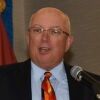The International Association of Fire Chiefs’ inaugural VCOS Symposium in the West is history. The two-day conference drew 128 fire service professionals who came to Reno, Nevada to learn from a variety of speakers.
Tim Shurr kicked off the symposium with a motivational presentation that got the attendees out of their chairs and comfort zones. He pushed the attendees with activities that challenged them to reframe their thinking processes to meet the problems they face.
Shurr gave the audience four techniques to improve confidence.
- Stand tall.
- Breathe slow and deep.
- Focus on a desired outcome.
- Use positive words and an encouraging tone.
Shurr also discussed key rapport techniques that can be remembered by LUV others — Listen to, Understand and Validate.
Shurr said that leaders must use words that create the correct emotional response for a given situation. For example, if a chief hears, “It’s not my problem,” the appropriate response might be, “Let’s solve this problem together.”
Get his e-book “The Cure for Self Sabotage” by texting 42828 “master your mind” in the body or online.
Later, Chief Tim Holman spoke about why leaders must maintain the passion they had when they first took on the job. He said that hope and faith in yourself and courage and compassion are key components to sustaining the passion in one’s personal and professional life
Leadership issues
Chief Donna Black presented a 20-minute program on the challenging traditional staffing models. Chief Black leads the Duck (N.C.) Fire Department and seeks creative ways to meet the challenges of staffing a department that serves 2,000 full-time residents but sees that number balloon to 10,000 people daily during the summer months.
Chief Black discussed the need for firefighters to be competent in the job they are expected to do. She also spoke to the need for certification of training and education. However, she said, it may not have to be a top priority for volunteer firefighters to be certified.
Chief Dan Eggleston looked at the problems with firefighters responding in personally owned vehicles. The death and injury to firefighters responding in their personal vehicle are many times accepted as part of the risk, he said.
Leaders must put in place policies and enforcement procedures to bring this practice under control.
In his focus on attitude’s role in leadership, Chief Eddie Buchanan discussed the need for officers to become proficient at solving complex problems. A chief’s attitude impacts their ability to solve personnel problems, he said.
Officers need to be able to lead, coach and counsel members in the fire station. However, he said, “your attitude impacts your ability to lead yourself long before your ability to lead others.”
Health and well-being
Firefighter Scott Gieselhart and Fire Chief Steve Heitman spoke on suicide in the fire service. Gieselhart suffered from post-traumatic stress disorder as a result of his service as a volunteer firefighter. He attempted suicide after abusing drugs to mask the pain.
Suicides are increasing because of the added stress on firefighters in emergency response, the culture of the fire service which requires firefighters to be tough and suck it up, and increases in PTSD that are often ignored until the situation becomes extremely dangerous. There were 119 fire service suicides in 2015.
Gieselhart’s message is fairly clear. “Stop ignoring the signs within yourself that you need professional help,” he said.
Those signs can be changes in emotional reactions such as irritability, always being on guard for danger, overwhelming guilt or shame, self-destructive behavior such as alcohol abuse, trouble concentrating, trouble sleeping and being easily frightened.
To battle another fire service menace, attendees were asked to contact their congressional representatives to gain support for the firefighter cancer registry legislation sponsored by Rep. Bill Pascrell (D-N.J.). Several large fire service organizations have publically come out in favor of the bill.
The proposed registry would establish a nationwide system to monitor the incidence of cancer among firefighters. Current data on firefighter cancer typically does not include volunteer or paid on-call firefighters — the proposed registry would.
The centralized database would also include basic demographics, age, age at the onset of cancer, years of service, number of incidents responded to and additional risk factors that might include use of tobacco and drug use.
I presented a TED Talks-style program that dealt with the challenges of training. Trainers must find ways to provide education that is pertinent to the functions associated with a firefighter in their specific fire department.
Experience is the hardest part to acquire in a reasonable period of time. Yet, experience can be enhanced with realistic, challenging and a comprehensive training program.













